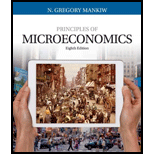
Example of adverse selection.
Answer to Problem 1CQQ
Option ‘b’ is the correct answer.
Explanation of Solution
Option (b):
Elaine, the buyer of health insurance knows more about her own health problems than the insurance company. The price of health insurance reflects the costs of an unhealthier person than an average person. So, Jerry who is healthy may observe the high price of insurance and decide not to buy it. Thus, option ‘b’ is correct.
Option (a):
Inspite of getting a health insurance, Elaine is not imperiling herself to illness. Hence, option ‘a’ is incorrect.
Option (c):
Health insurance does not signal the health issues of a person. Hence, option ‘c’ is incorrect.
Option (d):
The insurance company is not asking the parties for their health information. Hence, option ‘d’ is incorrect.
Concept introduction:
Adverse selection: Adverse selection refers to a situation where there is a lack of information existing in the market before the economic transaction takes place, thereby resulting in an undesired outcome.
Moral hazard: Moral hazard refers to changes in the behavior of people after they have entered into a transaction that makes the other party in the transaction worse off.
Signaling: Signaling is an action taken by an informed party to reveal private information to an uninformed party.
Screening: Screening refers to the action of one party in the process of finding the required skill and information of other party.
Want to see more full solutions like this?
Chapter 22 Solutions
Principles of Microeconomics (MindTap Course List)
- How might adverse selection make it difficult for an insurance market to operate?arrow_forwardSuppose an individual saves as precaution against adverse events, like unemployment. This is an example of a-adverse selection b-self-insurance c-adverse saving d-moral hazardarrow_forwardWhat would explain why moral hazard might not occur after the large gains in health insurance coverage?arrow_forward
- why is adverse selection important in healthcare insurance markets.arrow_forwardBriefly explain what it means for information to be asymmetric. a. What is Moral Hazard? b. Identify and briefly explain three methods that insurance companies could use to off-set the moral hazard associated with their industry. c. What is Adverse Selection?arrow_forwardSomeone indicated that employee’s absence from work despite meeting the eight hours per day requirement affect productivity and increase cost of business. If an employee makes up the hours by coming early and leaving late, how can you call it an example of moral hazard when the manager can easily correct this behavior? Please explain to the class.arrow_forward
- If people get higher pay from insurance than their pre premiums. Will this increase or decrease the death rate of average persons? Is this an example of moral hazard or adverse selection? How will an insurance company deal with these problems.arrow_forwardPeople drive faster when they have auto insurance. This is an example of: a. Adverse selection. b. Asymmetric information. c. Moral hazard.arrow_forwardIf people get higher pay from insurance than their premiums. Will this increase or decrease the death rate of average persons? Is this an example of moral hazard or adverse seletion? How will an insurance company deal with these problems?arrow_forward
- Adverse selection occurs because of A) spreading of risks. B) diminishing marginal utility. C) of imperfect information. D) moral hazardarrow_forwardJenny believes that the unwillingness to buy insurance by young healthy people creates a moral hazard problem for health insurance companies. Diego disagrees, and believes that their unwillingness to buy health insurance creates an adverse selection problem. Who is right? Explain.arrow_forwardHow is the moral hazard problem relevant to the health care market?arrow_forward

 Principles of Economics 2eEconomicsISBN:9781947172364Author:Steven A. Greenlaw; David ShapiroPublisher:OpenStax
Principles of Economics 2eEconomicsISBN:9781947172364Author:Steven A. Greenlaw; David ShapiroPublisher:OpenStax

